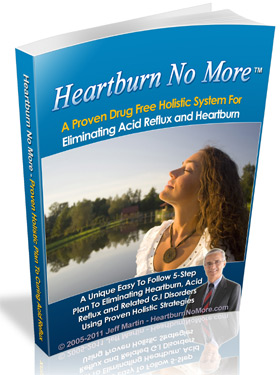Most of us have had some form of heartburn. It's something that affects millions of Americans each year. However, the symptoms can range from an acidic taste in the mouth to debilitating abdominal and chest pain. So how can you tell acid reflux symptoms from a sleeping disorder, food poisoning, laryngitis or a heart attack?
Thirty-one patients flooded into the Brigham and Women's Hospital emergency room in Boston, complaining of serious chest pain. It was later found that 57% of the patients merely suffered from Gastro Esophageal Reflux Disease. Study investigator Dr. Julia J. Liu commented, "Often the role of acid reflux has been overlooked as a potential factor in the diagnosis and treatment of patients with serious chest pain. But, it is important for patients never to assume their chest pain is caused by GERD, until they have been thoroughly evaluated by a physician to rule out heart disease. If they experience persistent chest pain, they should seek emergency medical care."
There are two types of heartburn - upright reflux, where patients are awake with noticeable discomfort, and supine reflux, which is more frequent in women and occurs when patients are asleep. Nighttime GERD affects approximately 10% of Americans, according to a study done by Dynogen Pharmaceuticals. In a separate study (conducted at the Southern Arizona VA Health Care System in Tucson), nearly three-fourths of the patients with chronic gerd symptoms also suffered sleeping symptoms such as snoring, coughing and chest pain.
"Nighttime GERD affects a large number of patients, and the impact on sleep and quality of life should not be underestimated," commented study leader Dr. Fass, who hopes to find more effective cures for supine reflux. Studies show that esophagus damage can occur with too much exposure to acid.
So how can you tell GERD / acid reflux symptoms from other similar ailments? More than half of the people who suffer chronic acid reflux also have dyspepsia, a condition where they feel nauseous, disgustingly full and suffer abdomen pain after eating. Dyspepsia is not necessarily a telltale sign of GERD.
Often times the chest pain worries people the most, who believe they may be having a heart attack. Both a heart attack and gerd symptoms could arrive after a heavy meal and leave its victim gasping for breath, doubled over with abdomen pain and sweating. In some cases, displaced acid in the esophagus activates nerves that impair blood flow to the heart temporarily, which can be a terrifying sensation!
While chest pain should not be taken lightly, here are some key differences to help you differentiate. GERD symptoms usually last for hours, while a heart attack generally lasts several minutes. H2 blockers or antacids will cure heartburn, while symptoms from a heart attack (like irregular heartbeat, pain, sweating and disorientation) will persist 15-20 minutes after taking the medication. Chest pain associated with symptoms may radiate vertically from the gut to the esophagus, but heart attacks often start beneath the right breast bone or on the left side of the chest and radiate along the length of the arms or from the chest to the back. You'll feel heartburn and acid reflux symptoms worsen if you're bending or lifting shortly after you've eaten, but with a heart attack, the smallest exertion makes you feel as though your heart may burst at any moment.
Millions of Americans suffer from acid reflux symptoms. So try not to panic when you feel the chest pains or shortness of breath coming on after that turkey dinner. Instead, take some medication and wait it out. Relief should come within 20 minutes.
Wednesday, March 5, 2008
Subscribe to:
Comments (Atom)


